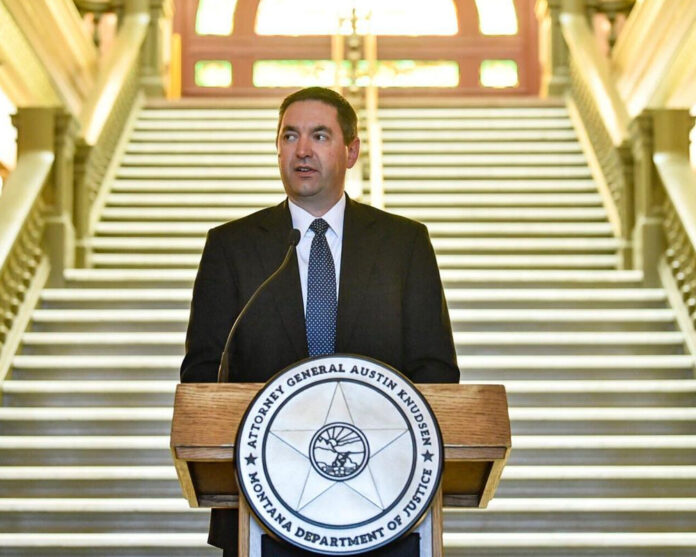HELENA – Montana Attorney General Austin Knudsen led a coalition of 24 attorneys general in filing an amicus brief Friday in the case of Johnson v. City of Grants Pass which asks the Supreme Court to reverse a lower court’s decision prohibiting states and local governments from enforcing laws that prevent public spaces from becoming homeless encampments.
In 2018, the Ninth Circuit wrongly found in Martin v. City of Boise that the Eighth Amendment provided the right to “sleep, camp, and defecate in public spaces.” Then in 2023, the court went even further to hold that the Eighth Amendment prevents civil fines for “engaging in involuntary, unavoidable life sustaining acts.” The attorneys general argue that if the lower court’s ruling is allowed to stand, the country’s growing homelessness problem will be exacerbated and hinder local and state policy response and encroach on states’ sovereign right to address the issue in a local way.
“In Grants Pass, the Ninth Circuit doubled down on Martin and insisted again that, unless a community provides adequate shelter, the Eighth Amendment bars any punishment based on ‘engaging in involuntary, unavoidable life sustaining acts’ like sleeping on public property,” the attorneys general wrote. “Since Martin, homelessness has grown worse across the country, and especially in the Ninth Circuit, where more than 1 in 1,000 people are now homeless and most States have seen homelessness rise at least 25% in five years.”
The Ninth Circuit’s ruling has tied the hands of officials in communities across Montana and the western United States that are struggling to combat widespread homeless encampments.
For example, in Montana, Missoula had 60 separate encampments across its 400 acres of public parks as of August 2023. However, the city is restricted in its ability to combat the issue following the 2018 decision that said jurisdictions must have bed space that outnumbers homeless persons before enforcing an anti-camping ordinance. Since the city cannot meet that requirement, residents are forced to deal with dirty and unsafe parks, vehicles “full of human waste,” and debris clogging the city’s irrigation and waterways. Similar problems are occurring in other Montana cities including Billings, Bozeman, and Kalispell.
“It is States and localities that have the local knowledge needed to address the problem, and it is States and localities that ultimately bear the costs of homelessness and of homeless policy. It should be States and localities that make the decisions,” the attorneys general wrote.
Attorneys general from Alabama, Arkansas, Florida, Georgia, Indiana, Iowa, Kansas, Kentucky, Louisiana, Mississippi, Missouri, Nebraska, North Dakota, Ohio, Oklahoma, South Carolina, South Dakota, Tennessee, Texas, Utah, Virginia, West Virginia also joined the brief which was co-led by Idaho Attorney General Raúl Labrador.
Click here to read the brief.




